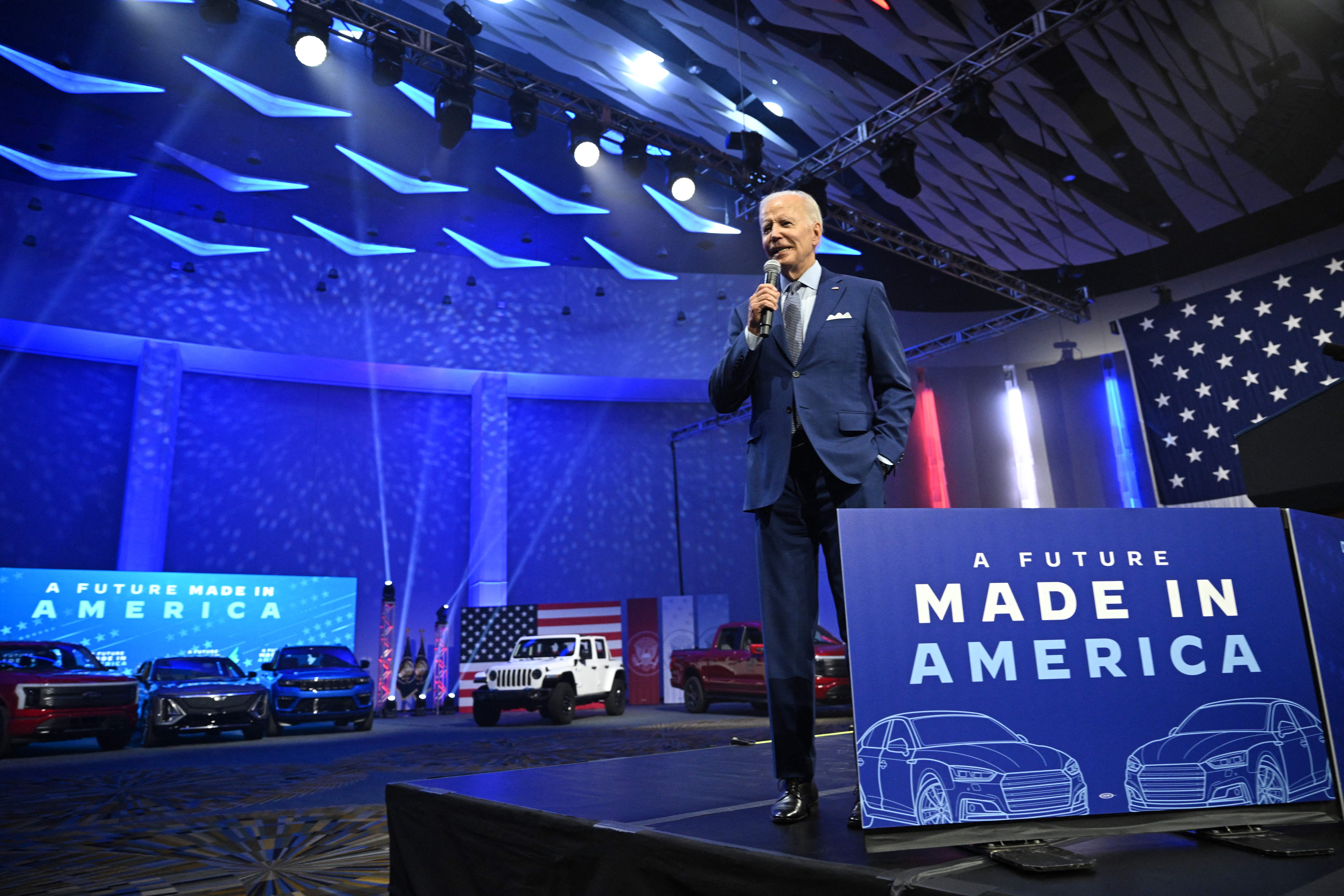Biden’s final EV tax credit rules please automakers, anger China hawks

The Biden administration finalized guardrails for its electric vehicle tax credit on Friday that keep President Joe Biden’s EV adoption goals in sight but are likely to draw challenges from critics on both sides of the aisle who say he is illegally opening the door for Chinese imports.
The rules offer some reprieve for automakers on the most severe restrictions on Chinese minerals, acknowledging that fledgling American battery suppliers will need years — or possibly decades — to catch up to their Chinese competitors.
The regulations nonetheless have left only around 20 percent of electric models qualifying for the lucrative incentive. That is unlikely to change with the final rules, as they continue to bar vehicles with a majority of their battery minerals sourced from abroad or relying on suppliers with even loose links to the Chinese government.
The Biden administration says its efforts to crack down on foreign suppliers are already paying dividends, as shown by the billions of dollars companies are investing in the United States to manufacture electric cars and the minerals that power them.
“This final rule strengthens our energy and supply chain security,” Deputy Energy Secretary David Turk told reporters ahead of the rules’ release. “[It will] make it easier for the energy industry to move away from risky supply chains tied to foreign entities that may not share our values.”
But critics — including Democratic Sen. Joe Manchin, who wrote much of the Inflation Reduction Act that created the credit — have hammered the administration for months over what they contend are loopholes that allow China to receive U.S. taxpayer subsidies.
The publication of the final rules now enables its critics to challenge them in the courts and in Congress.
Manchin in a statement Friday morning called the final regulations “outrageous and illegal” and said the administration is “effectively endorsing ‘Made in China.’”
promised to limit the credit.
The regulations finalized by Treasury and Energy Departments on Friday hew closely to the versions proposed last year that have been in effect even in their draft form. They include the rules outlining what percentage of foreign battery components and critical minerals can be in eligible vehicles, how dealers can offer the incentive at the point of sale, and which foreign suppliers — dubbed “foreign entities of concern” — are barred from accessing the credit.
The restrictions initially limited the number of qualifying electric and plug-in hybrid cars to roughly a dozen of the more than 100 models on the market. The list has since grown to around 22 models as automakers shift their supply chains to the U.S. and allied nations.
But given China’s dominance of the battery sector, automakers say it is possible every EV model on the market would become ineligible for the credit without some of the flexibility offered by the rules. That would strike a major blow to Biden’s efforts to make EVs more affordable, since the credit takes up to $7,500 off the price of new vehicles and $4,000 off for used EVs.
bipartisan congressional pushback has stymied further agreements. A senior administration official told reporters ahead of the rules’ release that the U.S. continues to hold talks for critical minerals agreements with the European Union, the UK and Norway.
Friday’s regulations also finalize the rules allowing car dealers to offer the credit to buyers as an instant discount or cash, a provision that Treasury says has been immensely popular since it took effect in January. The department said last month that more than 100,000 people have claimed the instant rebate this year, and it has reimbursed car dealers more than $580 million.
The final rules are unlikely to immediately shift the number of models eligible for the credit, given they largely align with the draft version. But the domestic content restrictions get tighter in January 2025 when the domestic critical minerals threshold increases to 60 percent, and the ban on sourcing critical minerals from foreign entities of concern kicks in (the rule currently only prohibits battery components from those entities).
Under a provision in the rules, the IRS will launch an upfront review process for automakers to submit documentation and certify that their vehicles meet all the requirements. Treasury announced Friday that review process will begin this summer.
Domestic battery minerals companies had pushed for greater changes to the foreign entity of concern rules, arguing that Chinese competitors are already gaming the proposed rules to make it harder for the domestic industry to compete.
Ben Steinberg, who represents a group of the U.S. battery firms called the Battery Materials & Technology Coalition, said the temporary exemption for graphite is “antithetical to the law and puts standing up this specific supply chain at great risk.”
But Steinberg praised the administration for requiring automakers to show a plan for shifting their supply chains, noting that could mean signing offtake agreements with U.S. companies that help shore up those projects’ financing.
Abigail Hunter, executive director of the Center for Critical Minerals Strategy at the energy security group SAFE, said in a statement the administration is “trapped by time” as it seeks to incentivize EVs while confronting the long timelines to scale up U.S. production.
She said the graphite grace period is a “reflection of this tightrope,” and urged the administration against any further extensions.
“We need a clear exit strategy, lest we continue our dependencies on adversaries and further undermine the competitiveness of U.S. and allied critical minerals projects,” Hunter said.
Source: politico.com